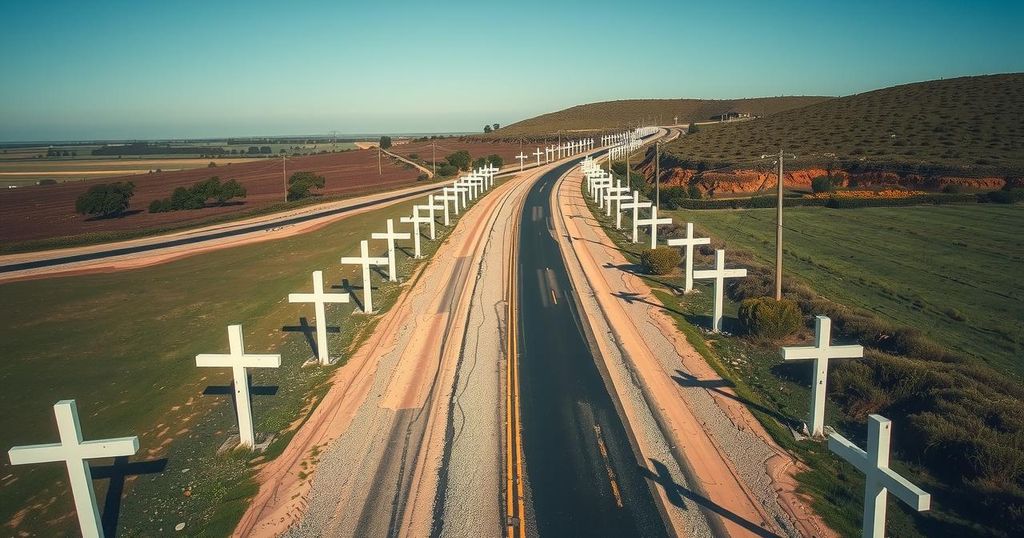South Africa’s Police Minister Condemns Trump’s False Claims on Farm Violence

South African Police Minister Senzo Mchunu criticized President Donald Trump for misrepresenting facts regarding violence against white farmers, specifically referencing a video shown at a White House meeting. Mchunu clarified that a video clip depicted temporary memorials, not burial sites, and addressed the broader issue of farm-related violence in South Africa. The government has firmly denied allegations of a genocide against white farmers, contending that such claims are rooted in misinformation.
In a recent statement, South Africa’s Police Minister Senzo Mchunu strongly condemned remarks made by U.S. President Donald Trump concerning white farmers in the country. Mchunu asserted that Trump misrepresented a video shown during a White House meeting with South African President Cyril Ramaphosa, claiming it depicted burial sites of over a thousand white farmers.
The video, which Trump described as “very bad,” showcased rows of white crosses, which he incorrectly associated with mass graves. Mchunu clarified that these crosses were actually temporary memorials erected in 2020 during a funeral procession for a white couple who were tragically killed in a robbery on their farm. He emphasized that the crosses do not signify burial sites but rather served as a protest against violence against farmers in general, irrespective of race.
Amidst ongoing issues of violent crime in South Africa, Mchunu noted that farm murders account for only a small fraction of homicides. Both white and Black farmers face violence, and the government has publicly condemned these attacks, regardless of the victims’ backgrounds. Mchunu, acknowledging the significance of the topic, stated, “They are not graves. They don’t represent graves,” and he criticized Trump’s claims as part of a misleading narrative aimed at inciting fear and division.
Mchunu further pointed out that the official reports contradict Trump’s unfounded allegations of a systematic genocide against white farmers. Of the reported 5,700 homicides in South Africa during the first quarter of the year, only six occurred on farms, with just one victim categorized as white. He expressed frustration at Trump’s portrayal, remarking, “It was unfortunate that those facts got twisted to fit a false narrative about crime in South Africa.”
Lourens Bosman, a former lawmaker who participated in the aforementioned procession, corroborated Mchunu’s statements, explaining that the crosses were meant to memorialize both white and Black victims of violence in the farming community over the past 26 years. He highlighted the community’s unity in mourning, irrespective of racial lines.
The South African government has adamantly rejected Trump’s claims that it is complicit in the alleged persecution of white farmers. President Ramaphosa’s administration has sought to refocus diplomatic relations with the U.S. and clarify misconceptions that harm bilateral ties. This effort comes after Trump issued an executive order earlier this year cutting U.S. financial assistance to South Africa due to accusations of the mistreatment of white farmers.
In light of these developments, the White House has yet to respond to South Africa’s criticism of Trump’s comments. As political tensions rise, both nations seem to grapple with the implications of these allegations and the broader narratives surrounding race and crime in South Africa.
In summary, South Africa’s Police Minister Senzo Mchunu has vocally challenged President Donald Trump’s assertions regarding a supposed genocide against white farmers in the country. Mchunu clarified the misunderstood video presented to Trump, emphasizing its context as a memorial for victims of crime, rather than burial sites. As the nation deals with widespread violent crime, the South African government insists that all farmers, regardless of race, face violence, strongly rejecting Trump’s baseless allegations. The situation underscores ongoing diplomatic challenges between the U.S. and South Africa as they attempt to navigate perceptions and relationships.
Original Source: apnews.com







